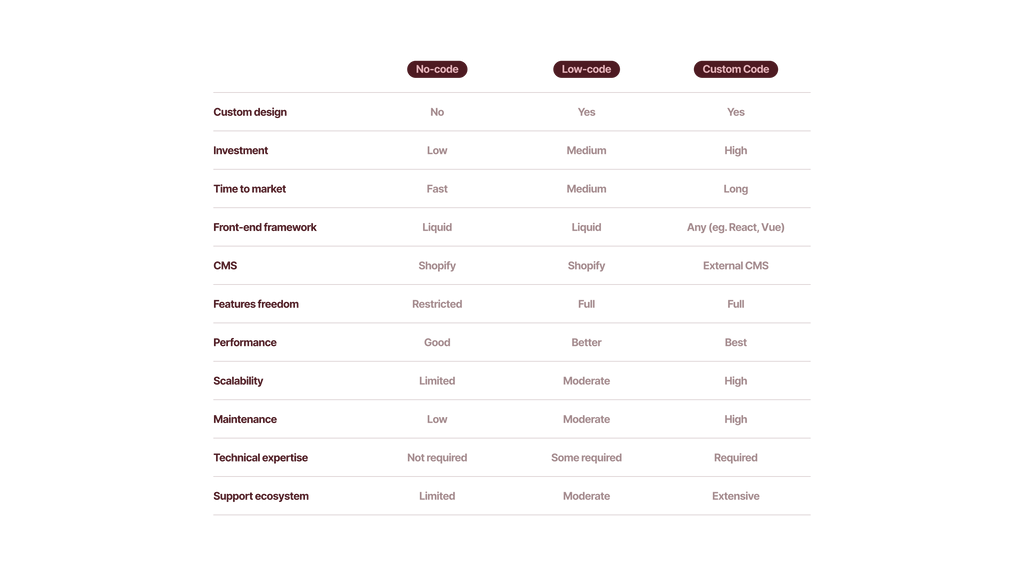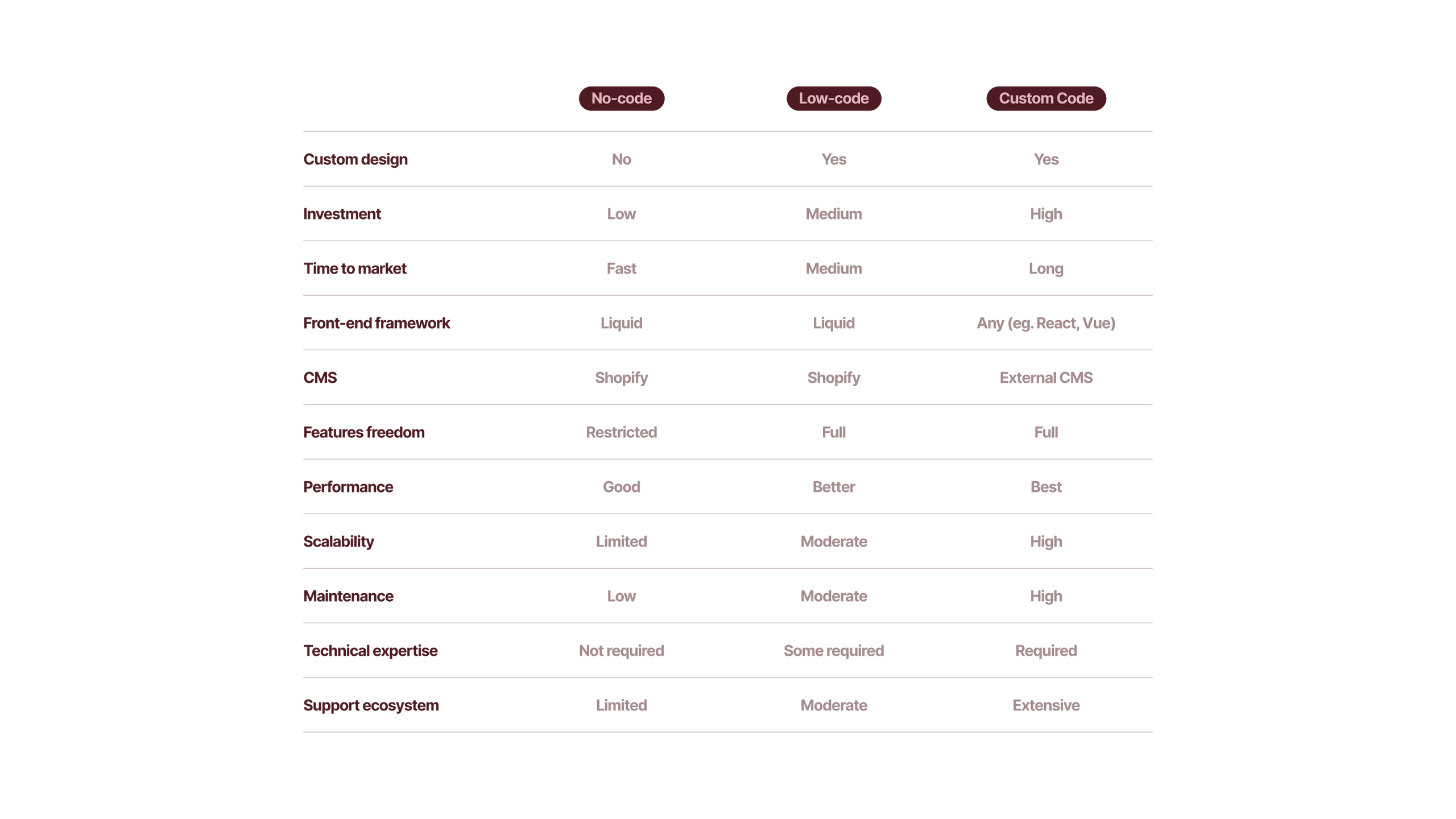
-
Shopify
+1
Klaviyo Vol 5: Solving Localised Double Opt-In at Scale
Klaviyo Vol 5: Solving Localised Double Opt-In at Scale
No-Code simplicity versus Custom-Code complexity


In the world of online business, choosing the right platform is like laying the foundation of a skyscraper. It is crucial to have a solid base that can support your growth. Shopify stands out as a top choice due to its sole focus on ecommerce, unlike Salesforce or Adobe, whose focus spreads across multiple other domains, such as customer relationship management (CRM), digital marketing, analytics, application development, and graphic design. And as we know, focus is important for success.
In our view, there are three ways to implement Shopify, each with its unique selling points (USPs) and varying levels of complexity. You can use Shopify as a no-code template setup, a low-code setup where you develop your own compatible Shopify theme, or a custom-code approach where you utilize Shopify's backend but add a custom storefront hosted outside of Shopify. Today, we will review all three options and explain when to choose each one. It’s not an easy choice, but we’re here to help you make the right decision.
At the heart of Shopify's appeal lies its robust infrastructure and extensive API features. Think of Shopify as the bedrock upon which successful ecommerces are built. With its user-friendly interface and a myriad of built-in functionalities, Shopify takes care of approximately 80% of your ecommerce needs right out of the box. This leaves room for customization and expansion, ensuring your online store grows seamlessly alongside your business.
One of the key advantages of Shopify is its scalability. Whether you're just starting out or managing a high-volume enterprise, Shopify can accommodate your needs with ease. The platform's flexibility allows businesses of all sizes to thrive in the competitive ecommerce landscape. Additionally, Shopify's commitment to innovation means you'll always have access to the latest tools and technologies to stay ahead of the curve.
Below, you will find an overview of key decision factors to consider when selecting the appropriate setup:


Our recent collaboration with COPA, specializing in retro football apparel and accessories, exemplifies the power of no-code solutions. Our goal was clear: create a streamlined solution to empower COPA to focus on other aspects of their business. Here's how we made it happen:
Keeping our construction metaphor in play, consider the No-code approach as adding personal touches to a prefabricated home. This involves building a custom Shopify theme based on pre-existing templates. This approach not only streamlined the development process but also allowed us to enhance COPA's online platform with unique features while ensuring optimal performance and scalability. Their favorite aspect of the new platform is its flexibility in allowing creative expression. Additionally, they value Shopify's Analytics feature for its comprehensive yet accessible reports, making it easy and enjoyable to track performance metrics even for those more focused on creative marketing.
The Low-Code approach of building on Shopify and creating custom liquid front-ends have become indispensable tools for businesses seeking to tailor their online presence to meet specific branding needs, incorporate custom designs, and implement unique features which cannot be found in off-the-shelf Shopify themes. Much like adding personal touches to a prefabricated home, the Low-Code approach enables businesses to strike the perfect balance between utilising the full suite of Shopify’s capabilities and features, ease of use and customization within the Shopify ecosystem. While being able to fully customize the front-end of the store we operate within the set parameters by Shopify ensuring we stay on the feature train of Shopify.
In a recent project with Pink Gellac, a forward-thinking player in the beauty industry, epitomizes the proactive approach to digital transformation. With a keen eye for innovation and a commitment to elevating customer experiences,Pink Gellac partnered with our agency to switch their platform from Magento to Shopify.
Leveraging the Low-Code approach, our team devised innovative solutions to address the challenges encountered by Pink Gellac in its pursuit of digital excellence. Building upon the seamless integration of a Low-Code custom Shopify theme and customization within the Shopify framework, our objective remained clear: to enhance customer engagement, loyalty, and satisfaction through tailored digital solutions.
Central to this project was the implementation of a customized loyalty program, which incentivizes customer engagement and rewards loyalty through points accumulation and redemption. We further personalized the program visually to align seamlessly with Pink Gellac's brand identity, ensuring a cohesive and immersive experience for users. Expanding its reach, we made the loyalty program available to specific markets and countries, amplifying its impact and relevance across borders.
Additionally, we localized the program into four languages, empowering diverse audiences to engage with Pink Gellac on their terms, thereby fostering inclusivity and connection. These initiatives exemplify Pink Gellac's commitment to meeting the dual objectives of increasing customer retention and loyalty while catering to the needs of professional customers without compromising inclusivity.
The implementation of this Low-Code solution yielded remarkable results for Pink Gellac:
Pink Gellac's project highlights how using low-code solutions and customization in the Shopify ecosystem can transform a business. Their focus on innovation and teamwork has raised the bar for customer engagement in the beauty industry, demonstrating how strategic changes and digital tools can lead to growth and success.
For large enterprises or businesses with highly specific requirements, the custom-code journey in Shopify offers unmatched flexibility and customization options. Similar to building a mansion from scratch, this approach allows businesses to tailor every aspect of their online store to exact specifications. Brands choosing a custom-code approach, often referred to as headless or composable, typically seek one of several advantages. They may prefer a front-end built in a language other than Liquid, such as React. Alternatively, they might have specific feature requests at the CMS level, which would make it advantageous to opt for an external CMS. Additionally, brands may choose this approach to achieve the highest possible performance from their tech stack.
With the custom-coded approach, advanced functionality and unique customer experiences take center stage. While this approach necessitates a more significant investment of time and resources, the payoff in terms of unparalleled customization and control is well worth it for businesses seeking to differentiate themselves in the market.
One such success story is MR MARVIS, an Amsterdam menswear brand with a vision for excellence in ecommerce.
Having already established a Shopify store, MR MARVIS wanted to elevate its online presence to meet the demands of its growing customer base across Europe. Their primary goal? Site speed. Recognizing the importance of delivering a seamless experience, they opted for a headless migration, renowned for its ability to create lightning-fast stores.
They decided to partner with us to transition their store to a headless architecture. We implemented a custom headless tech stack. The brand combined Shopify Plus as the back-end powerhouse with the CMS platform, Sanity.
With React and Next.JS at the frontend , alongside specialized tools like Turborepo and Sentry, we crafted a high-performance solution tailored to their specific needs. This custom tech stack setup not only ensured blazing-fast speeds but also provided the flexibility to adapt and grow with the brand.
Another key aspect of the project was achieving full site flexibility while streamlining content management. Despite maintaining multiple back-end structures for different countries, the implementation of Sanity Connect allowed for a unified front-end experience. This streamlined content updates and product management across all MR MARVIS stores, eliminating redundancies and enhancing efficiency.
The result? MR MARVIS now boasts a state-of-the-art ecommerce platform, positioning them as one of the largest Shopify merchants in The Netherlands. This successful collaboration highlights the power of custom-code solutions in delivering exceptional experiences tailored to the unique needs of businesses.
Selecting the optimal approach for your Shopify store hinges on various factors, including business size, budget, timeline, technical resources, feature requirements, and branding considerations. Ask Phill is a knowledgeable partner in guiding businesses through this decision-making process, offering tailored solutions to suit their needs.By considering the unique requirements and objectives of your business, you can determine whether a no-code, low-code, or custom-code approach is the best fit. Whether you're aiming for a quick and cost-effective setup or a fully customized ecommerce solution, Shopify's versatility ensures that there's a blueprint to suit every business stage and goal. Remember, our Ask Phill team is here to help. Contact us for advice and consultancy – we're happy to guide you.
Do you want to
stay updated?
Yes

Klaviyo Vol 5: Solving Localised Double Opt-In at Scale
Klaviyo Vol 5: Solving Localised Double Opt-In at Scale

The gap is widening
Shopify Winter '26 Edition: 10 Reasons Not Being on Shopify Is Now a Competitive Disadvantage

The early-access strategy that increased conversions to 33%
Klaviyo Vol 4: Travelteq’s WhatsApp Advantage
Stay ahead
Subscribe to our newsletter for a roundup of the latest in ecommerce, straight to your inbox.